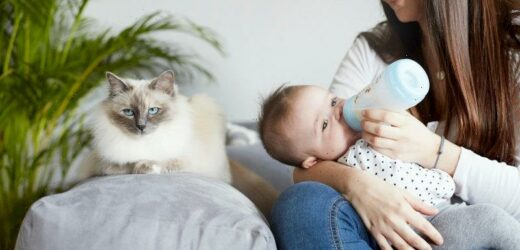Breastfeeding advocates are pushing for tough new laws to stop “predatory and exploitative” marketing of baby formula ahead of a federal review of the industry’s voluntary code.
The federal health department is preparing to review the industry code – called the Marketing in Australia of Infant Formulas (MAIF) agreement – including whether companies in the $75 billion global industry should be allowed to advertise toddler milks.
Baby formula manufacturers have been caught out breaching the industry code by marketing products to mothers.
Australian Breastfeeding Association President Margaret Grove said the MAIF agreement was “a toothless tiger” without sanctions for breaches and that a total ban – covering all producers and retailers, and preventing promotion to health professionals – was needed.
“You get a slap on the wrist and it only covers signatories,” Grove said.
She said plain packaging laws, like those that apply to tobacco products, were “not a bad idea” and could stop infant formula makers from promoting their brands through regulatory loopholes.
The health department resolved 55 complaints about infant formula marketing in 2020-21, the latest data available, and found 10 breaches against the MAIF agreement including on social media platforms, Google search advertising and email marketing campaigns.
The majority of complaints were dismissed because they related to companies which had not signed the code; or the promotion of toddlers milks or retailers’ marketing activities, which it does not cover.
A health department spokesman said an external reviewer would be appointed to review the MAIF agreement “by the end of 2022”.
The peak body for infant formula makers, the Infant Nutrition Council, denied using aggressive marketing strategies and accused the ABA of “political statements” that made mothers who used formula feel guilty.
“We don’t undermine breastfeeding,” the council’s chief executive Jan Carey said, blaming low breastfeeding rates on a lack of family and workplace support.
Grove said the association did not have a problem with “formula as a product”.
“It’s trying to stop the predatory and exploitative marketing,” she said.
The Infant Nutrition Council is selling tickets to a cocktail event at Parliament House in June, promising access to “government officials” and seeking between $5000 and $10,000 from sponsors.
A global report published by the World Health Organisation and UNICEF in February found that multinational infant formula makers were engaged in “systematic and unethical marketing strategies” that manipulated scientific claims to undermine women’s confidence in breastfeeding.
Grove said infant formula companies were using toddler milk advertisements, which they are allowed to promote, to achieve brand awareness.
“If you see an ad for particular brands for toddler milk, and then you go to the supermarket, they’re all in tins that look very similar,” she said.
Research has shown that many toddler milk products are high in sugar, contain fewer key nutrients and are more expensive than regular milk, but they are not covered by the industry code.
But Carey said manufacturers should not be restricted from advertising them.
“If you can market cocoa puffs, if you can market gummy vitamins that are full of sugar, then you should be able to market toddler milk drinks,” she said.
Almost all the 300,000 babies born in Australia each year are breastfed from birth, but rates plummet after mothers leave the hospital.
A national survey in 2010 showed just 15 per cent were exclusively breastfed to 5 months. The World Health Organisation and the National Health and Medical Research Council recommend exclusive breastfeeding to 6 months.
Health Minister Greg Hunt unveiled a National Breastfeeding Strategy in 2019, with the goal of increasing exclusive breastfeeding to 6 months to 40 per cent by 2022. But the government does not know if this target will be met as it has not ordered another national survey.
A spokesman for Hunt said women “should be supported to breastfeed, recognising that breastfeeding is a key contributor to infant and maternal health.”
“Our government has provided support for education and awareness for breastfeeding through a number of initiatives, including funding the National Breastfeeding Helpline 1800 MUM2MUM (1800 686 268) run by the Australian Breastfeeding Association (ABA),” the spokesman said.
A Labor spokesman said the Coalition had failed to deliver on its plan and that an Albanese government would “look to work closely with the ABA to better support breastfeeding families”.
Most Viewed in Politics
From our partners
Source: Read Full Article



